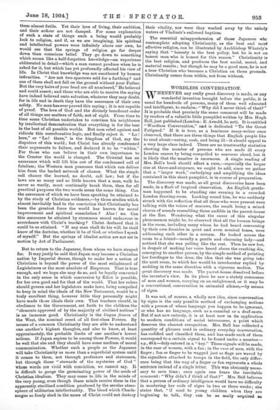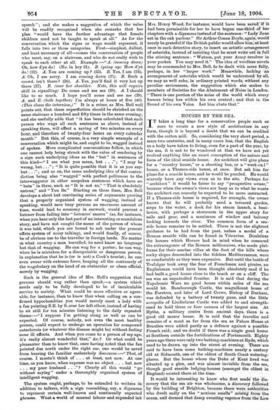WORDLESS CONVERSATION.
WHENEVER any really great discovery is made, or any wonderful invention brought before the public, it is usual for hundreds of persons, many of them well educated and intelligent, to exclaim: "Why did I never think of that?" It is probable that precisely the same comment will be made by readers of a valuable little pamphlet written by Mrs. Hugh Bell, just published (London : E. Arnold, is. net). It is entitled "Wordless Conversation," and is dedicated "To the Great Fatigued." If it is true, as a luminous essay-writer once observed, that there are three things that English people like to read about—eating, cash, and being ill—it should appeal to a very large class indeed. There are no trustworthy statistics showing the number of persons who are made ill every London season by being compelled to converse aloud, but it is likely that the number is enormous. A single reading of Mrs. Belts book should effect a cure,—especially the larger size at three-and-sixpence, we ought to add, since we gather that a "larger work," embodying and amplifying the ideas contained in this short pamphlet, is in course of preparation.
The discovery was made, as all great discoveries have been made, in a flash of inspired observation. An English gentle- man happened to be standing one evening in a crowded London drawing-room. Looking round him, he was suddenly struck with the reflection that all those who were present were talking with the voices of macaws, the result being a mixed chorus of sounds resembling those audible in the parrot-house at the Zoo. Wondering what the cause of this singular phenomenon might be, he observed that all the human beings in the room, including many whom he had heard conversing by their own firesides in quiet and even musical tones, were addressing each other in a scream. He looked across the room to a friend—usually a gentle and charming lady—and noticed that she was yelling like the rest. Then he saw her, in despair of making her voice heard above the crashing din, conveying to another person, by the simple method of pointing her forefinger to the door, the idea that she was going into the next room, to which her would-be interlocutor replied by nodding in the same direction with a vigorous motion. The great discovery was made. The parrot-house dissolved before the inventor's view. In its place he saw a stately concourse of men and women, carrying on an enlightened, or it may be a conventional, conversation in animated silence,—by means of signs.
It was not, of course, a wholly new idea, since conversation by signs is the only possible method of exchanging notions with a person of whose language you happen to be ignorant, or who has no language, such as a cannibal or a deaf-mute. But if not new entirely, it is at least new in its application to modern conditions of social intercourse, a point which deserves the clearest recognition. Mrs. Bell has collected a quantity of phrases used in ordinary everyday conversation, has codified and classified them, and has made each of them correspond to a certain signal to be found under a number- e.g., 48A—duly entered in a "key." These signals will be made, in the case of women, with a fan; in the case of men, with the finger ; fan or finger to be wagged just as flags are waved by the signallers attached to troops in the field, the only differ- ence being that the wag of a finger or fan represents a whole sentence instead of a single letter. This was obviously neces- sary to save time ; once again one hears the inevitable comment : "Why didn't I think of that ?" Mrs. Bell believes that a person of ordinary intelligence would have no difficulty in mastering her code of signs in two or three weeks ; she states that, "if used to young children when they ,are beginning to, talk, they, can be as easily acquired as speech" ; and she makes a suggestion of which the value will be readily recognised when she remarks that her plan "would have the further advantage that female children need not be taught to speak at all." As for the ' conversation which the signs or wags would represent, it falls into two or three categories. First—simplest, dullest, and least necessary of all—comes the conversation of people who meet, say, on a staircase, and who do not really wish to speak to each other at all. Example :—"A. (coming down) Oh, how d'ye do! (No. in key 31). B. (going up) How d'ye do ! (32). A. You are coming up ? (33). B. Yes, I am (34). A. Oh, I am sorry. I am coming down (35). B. Such a crowd, isn't there ? (36). A. Yes, you'll find it very hot up there (37). B. (over her shoulder. Note, this will require skill in signalling) Do come and see me (38). A. I should like to so much. I hope you'll come and see me (39). A. and B. (both together) I'm always at home at five* (40). (This closes the interview.)" It is a crime, as Mrs. Bell well points out, that these superfluities should be shrieked on the same staircase a hundred and fifty times in the same evening; and she usefully adds that "it has been calculated that each person who wags all such sentences as above, instead of speaking them, will effect a saving of two minutes on every hour, and therefore of twenty-four hours on every calendar month." But this, of course, is a very simple example of a conversation which might be, and ought to be, wagged instead of spoken. More complicated conversations follow, in which one cannot help being struck with the value of rendering by a sign such underlying ideas as the " but " in sentences of this kind—" I see what you mean, but . . ." ; "I may be wrong, but. . ." ; "It is quite possible that it is as you says but . . ." ; and so on, the same underlying idea of flat contra- diction being also "wagged" with perfect politeness to the interwaggutor in other unspoken sentences which have no " buts" in them, such as "It is not so," "That is absolutely untrue," and "You lie." Starting on these lines, Mrs. Bell develops a short but convincing series of arguments proving that a properly organised system of wagging, instead of speaking, would save busy persons an enormous amount of time, would lead to economy in earwork, would prevent a listener from falling into "listeners' snares" (as, for instance, when you hear only the last part of an interesting or scandalous story, and have not caught the name of the person of whom it was told, which you are bound to ask under the present effete system of noisy talking), and would finally, of course, be of obvious use to the traveller in foreign lands. No matter m what country a man travelled, he need know no language but that of wagging. He can wag for a porter; he can wag, when he is mistaken for a disreputable or dangerous person, in explanation that he is (or is not) a Cook's tourist; he can even swear with extreme force, heaping all the contumely of the wagobulary on the head of an obstacular or obese official, merely by wagging.
Such is the general idea of Mrs. Bell's suggestion that persons should wag rather than speak,—a system which needs only to be fully developed to be of incalculable service to society. What could be more effective or agree- able, for instance, than to know that when calling on a con- firmed hypochondriac you would merely meet a lady with a fan pointing S.E. by S. over her left elbow, instead of having to sit still for ten minutes listening to the daily repeated theme:—" I suppose I'm getting along as well as can be expected. Of course, nobody, not even the most healthy person, could expect to undergo an operation for compound catachresis (or whatever the disease might be) without feeling some ill effects. And when you come to a person of my age, it's really almost wonderful that," &c.P Or what could be pleasanter than to know that, once having noted that the fan pointed due north under the right ear, one would be saved from hearing the familiar melancholy discourse :—" That, of course, I mustn't think of , . . at least, not now. At one time, as you know, when expense was no object . . . but now . . . my poor husband . . ." P Clearly all this would "go without saying" under a thoroughly organised system of intelligent wagging.
The system ought, perhaps, to be extended to writers in addition to talkers, with a sign resembling, say, a digamma to represent certain well-known and continually expected phrases. What a world of manual labour and expended ink
Mrs. Henry Wood, for'ingance;'wthild have been saied if it had been permissible for her to have begun one-third of her chapters with a'digaminainatead of the sentence : "Lady Jane sat in the oak parlous-." Sir Arthur Conan Doyle, again, would 'surely be grateful-if the British public would allow him; at least 'once in each 'detective story, to insert an artistic arrangement 'of asterisks; instead of insisting that he must Writer mit in full the stirring sentende : "Watson, put your Army revolver in your pocket: You may need it."' The idea of wordless novels may be commended to Mrs. Bell, to be dealt' With more fully, perhaps, in her "larger 'work?' Meanwhile, lacking arrangement of asterisks which would be Onderstood by all, we may as well echo, in ordinary printed words; without any peculiar - seriouSness, the suggestion which she makes to members of Societies for the Abatement of Noise in London: " There is one portion of 'the noise of the world which every human being has within his own control ; and that is; the Sound of his 'own Voice'. Let him abate that."







































 Previous page
Previous page